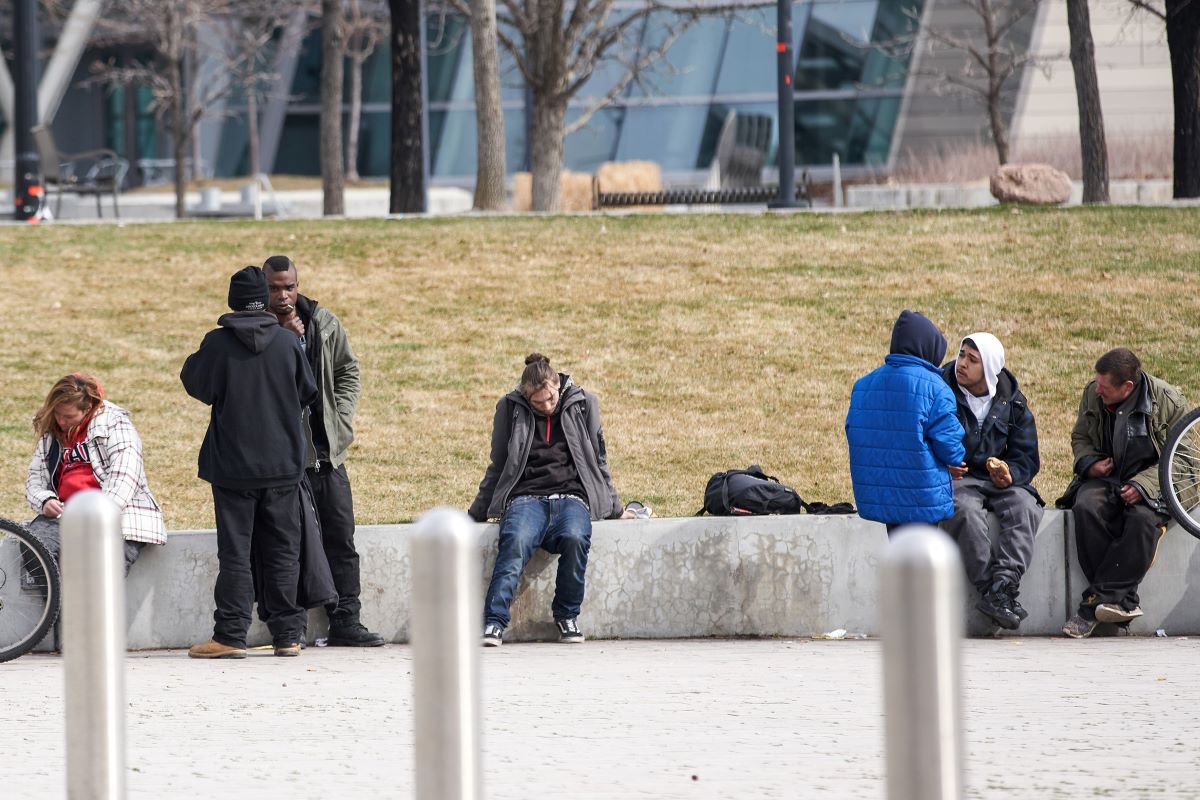“We cannot arrest our way out of homelessness. Unsheltered communities are often further entrenched in day-to-day difficulties due to costly and needless citations or arrests.”
— Jason Groth, Deputy Legal Director, American Civil Liberties Union (ACLU)
21-year-old Joey Fiala said he’d been to jail twice for public camping in Fort Collins, Colorado. The youth, who found camping and comradery in a tent city located on the side of a bustling railroad track, has a rough road ahead of him. While the title “homeless” isn’t officially documented as part of his identity, his criminal record will be marred with the etchings of this checkered past for years to come, making it difficult for him to obtain housing and employment both now and in the future.
In the face of anti-homeless legislation, encampment residents far and wide head for the hills come nightfall, eager to avoid the watchful eyes and ticket-happy fingers of law enforcement officials.
Masking the crisis in this manner is precisely why our government drafts laws making it illegal for people enduring homelessness to sleep, stand, sit, or otherwise engage in life-sustaining activities in public.
These pieces of legislation, which currently exist in 48 states nationwide, do nothing to solve homelessness. Like a smoke-in-mirror magic trick, they simply shift the public focus long enough to move the problem and make it look like it’s disappeared.
Multiple studies have revealed this fact, but that doesn’t seem to sway public opinion. As crushing as it is to admit this, we are swiftly becoming a society more concerned with the visibility of homelessness than the state of it.
‘Displaced and Dispersed: The Aftermath of Operation Rio Grande’ Confirms Criminalizing Homelessness is Ineffective
In October 2022, the ACLU of Utah released a riveting report detailing the harms and horrors of homeless criminalization and solidifying the growing concerns of housing advocates.
The report, entitled “Displaced and Dispersed: The Aftermath of Operation Rio Grande,” is a follow-up to previous examinations of the ORG Project, a law-enforcement-led initiative launched in 2018.
Operation Rio Grande, more commonly referred to as ORG, was presented to the public as a way of helping unsheltered individuals out of homelessness. However, according to the Salt Lake Tribune, it was actually criminalizing homelessness and failing thousands of individuals in the process. Investigative reporters quickly uncovered that by 2020, 80% of the funding for Operation Rio Grande had been spent policing and, in many cases, imprisoning unhoused Salt Lake City residents.
At the time, ACLU Deputy Legal Director Jason Groth called the program “a misguided attempt to use the criminal legal system,” and rightly so…
Under the banner of public safety restoration, law enforcement officials inundated the houseless community with arrests resulting in 1,442 felonies and 3,323 misdemeanors in just the first two years of the program’s inception. In response, the ACLU of Utah released three separate reports critiquing the program and alerting the public of its negative results and overall ineffectiveness to solve the real homelessness crisis.
As of the summer of 2020, Operation Rio Grande was described as dwindling and is now considered obsolete. However, that doesn’t mean policing hasn’t left its mark on the lives and futures of thousands of people.
The latest effort published by the ACLU scrutinized the results of the now-defunct operation, drawing the following conclusions based on provided data:
- Unsheltered individuals shuffled through the criminal justice system did not increase their chances of obtaining permanent housing or exiting homelessness in the way the program was initially described to the public.
- Ending federal eviction moratoriums and resuming the enforcement of anti-camping legislation resulted in increased arrests for Utahns experiencing homelessness.
- Such arrests led to an influx of houseless individuals entering the criminal system.
- Harassment of known unhoused locals by law enforcement officials became commonplace. Examples include following some “known transients” from one place to another and issuing warrants to people they came in contact with along the way.
- Such targeting and harassment subtly encouraged many unhoused Utahns to move to more obscure places that were further away from the services and resources they needed to survive.
- Cases of citations remained in court for an average length of three months.
- Average fines totaled approximately $665 in Salt Lake County.
- Repeat citations and arrests created an unbalanced approach to the perceived “crime” of homelessness.
- Tensions and distrust arose between law enforcement officials and unsheltered individuals.
- Homeless people were forced to appear in court multiple times over the course of just a few months, a difficult task for many who lacked transportation, internet, and cell phone access, clean clothes, and other vital resources needed to make these appearances.
- Failure to appear in court resulted in further arrests, fines, and citations.
In the end, the slew of citations and arrests cost taxpayers millions. They cost houseless community members even more.
Operation Rio Grande did not help people exit the burdensome state of homelessness. It added to the burden by forcing unhoused people to prioritize court dates over necessary medical appointments, miss days at work and lose wages or employment opportunities, incur hefty fines, spend what little savings they had on court fees and transportation, and endure many more hardships.
To quote the source material directly, “unsheltered individuals often find themselves in a worse place than they started before the camping citation, even when the case is dismissed.”
We Can No Longer Afford to be Silent on this Issue. Talk to Your Policymakers About Drafting Laws That Prioritize Housing Over Handcuffs
Studies continue to prove that criminalizing homelessness does not rectify the situation – not even temporarily. Salt Lake City spent $55.3 million in taxpayer money to prove yet again that policing homelessness is ineffective.
When housing advocates are silent, politicians pedal shifty tactics at the podium, appeasing the public by sweeping homelessness out of sight rather than presenting any actionable long-term solutions. Urge your legislators to replace anti-homeless legislation with laws that make housing a human right.













